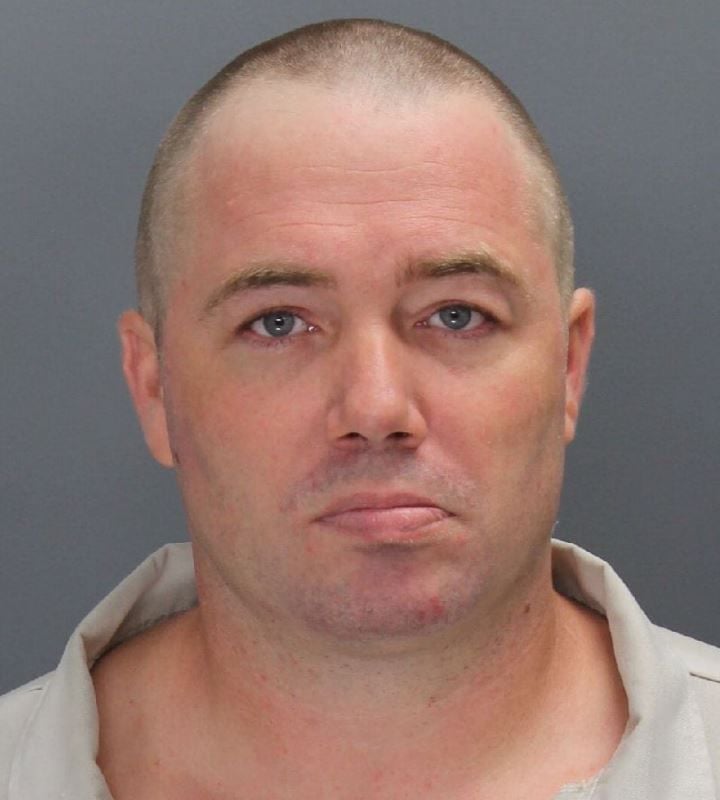Will 'certainty of punishment' for Sidney Moorer help crack Heather Elvis' disappearance?

Sidney Moorer, pictured on Sept. 1. S.C. Department of Corrections/Provided
Seconds after learning his punishment for impeding the investigation into Heather Elvis’ disappearance, Sidney Moorer stood and walked out of an Horry County courtroom with a full head of hair and a beard — the same look he had sported when he was arrested.
Two days later, the 41-year-old stood for a photograph that showed his shaved head and a blank expression on his smooth face.
He was in prison.
With parole, Moorer is likely to serve only half of his 10-year sentence. But that term will pass slowly, and the man who might hold key answers in the case will have time to ponder his future, said Fran Humphries, a Myrtle Beach lawyer and a former chief deputy solicitor in the 15th Circuit.

Heather Elvis. Provided
And from behind bars, Moorer will await retrial on a charge of kidnapping the 20-year-old Elvis. That could net him another 30 years.
“There is now certainty of punishment for him and a foreshadowing of what might be in the next trial," Humphries said. “He’ll have time to consider that while he’s incarcerated. Does that change his mind about talking to police? Does that change his position of innocence?”
No date for the proceeding has been set, but it’s almost certain to happen. His wife also remains accused of kidnapping. Solicitor Jimmy Richardson declined to comment, citing a judge’s gag order.
The Aug. 30 guilty verdict for Moorer on an obstruction of justice charge was uncommon in South Carolina. Over a five-year period that ended June 30, 800 such cases were filed statewide, and only seven prompted guilty verdicts, according to the S.C. Judicial Department. Most often, the charges are dropped before trial.
It’s a type of prosecution often used to break open investigations that have gone cold, and the charge sometimes becomes leverage against key players in missing-person probes, attorneys said.
The tactic has been employed elsewhere. Earlier this year, a potential subject in Brittanee Drexel’s presumed abduction from Myrtle Beach pleaded guilty to an unrelated charge, which his attorney called a fruitless bid to squeeze clues from a man who had none.
But Elvis’ family members hope the successful prosecution of Moorer is a milestone in the effort to find answers they have long sought.
After jurors delivered their verdict, loved ones told 50,000 of their followers on a Facebook page that some of their prayers had been answered.
But their ordeal is not through.
"This conviction is a step in the direction of justice for me," Elvis' mother, Debbi, told The Post and Courier, "because it causes all of those involved in taking Heather, and keeping her from us, to see the gravity and reality of what they have done."
A law enforcement 'tool'
Moorer's romantic relationship with Elvis had ended before she vanished Dec. 18, 2013.
Horry County police officers confronted him two days later and asked about his contact with the young woman. That’s when, prosecutors said, he lied about the extent of their telephone communication and about being handcuffed to his bed around the time Elvis went missing — a supposed punishment by his wife, Tammy, for the affair.
The authorities later produced video footage of Moorer using a payphone to get in touch with Elvis and records indicating that he had deleted text messages from his cellphone.
Three months later, he was arrested on charges that included murder, kidnapping and obstruction of justice. The murder count was dropped in 2016, and the kidnapping charge prompted a hung jury that June.
During the obstruction of justice trial last month, Circuit Judge Markley Dennis agreed with Moorer’s attorneys that the law on the crime is murky. It’s a "common law" provision derived from legal custom and precedent rather than South Carolina’s written codes.
The muddy definition might play into the charge’s frequent demise.
Including guilty pleas, only 28 percent of the 800 cases resulted in convictions over the past five years, compared with 41 percent of all criminal charges, the state statistics showed.
And 61 percent were dropped by prosecutors, compared with 51 percent of all counts.
On average, 160 obstruction cases are filed every year statewide.
“Obstruction cases are generally used by police as a tool to get information on a charge they lack evidence for,” North Charleston attorney Chris Lizzi said. “They seem to be becoming more common in cold cases.”
Lizzi represents Bob McCaffrey, the husband of Gayle McCaffrey, 37, a Charleston mother who vanished with little trace in March 2012. Bob McCaffrey is awaiting trial on the charge.
Last year, more than a decade after Brandy Hanna went missing from North Charleston, a boyfriend of the 32-year-old waitress was charged with obstruction.
And in Drexel’s 2009 disappearance, a federal grand jury indicted Timothy Da'Shaun Taylor in a bank robbery for which he had already served a state probationary sentence; FBI agents hoped he would divulge information about Drexel. A jailhouse informant had alleged that Taylor and his father in eastern Charleston County had killed Drexel, 17, and dumped her body in an alligator pit.
But Taylor, 26, gave them no clues.
“The obstruction of justice charge is a way to get people talking, like the robbery charge was for my client,” lawyer Mark Peper said. “Most of the time, it works. But when the guy doesn’t know anything, the case usually gets kicked. That’s what should have happened in the Drexel case.”

Sidney Moorer (left) and wife Tammy Moorer. Provided
Incomplete justice
Prosecutors had to prove that Moorer wanted to steer investigators down the wrong path, wasting precious moments in the search for Elvis.
Several times during her closing argument, Assistant Solicitor Nancy Livesay tapped on a clock.
“His intention was to mislead them,” she said. “And this is ticking the whole time. Seconds matter.”
His lead attorney, Kirk Truslow of Myrtle Beach, argued that the effect of Moorer’s lies on the investigation was exaggerated. He called prosecutors’ accusations “atrocious.”
“They’ve fumbled this thing for four years,” he told jurors. “Are you just trying to put somebody away, just so we can say we put somebody away?”
After the trial, Truslow said Moorer planned to appeal because of the “lack of evidence” indicating his client had obstructed justice.
“One problem is that the common-law obstruction charge is really so vague and overbroad that it is unconstitutional," Truslow told The Post and Courier. "I also believe it is obvious that much more of the trial had to do with the underlying allegations."
That kidnapping accusation puts the responsibility for Elvis’ disappearance on the Moorers’ shoulders, while falling short of blaming the couple for her presumed death.
Dennis, the presiding judge, is expected to set a date for the retrial, likely putting Moorer's case before his wife's.
Humphries, the former prosecutor, said it’s common for solicitors to advance an obstruction case with the ultimate goal of cracking a larger one. But he wouldn't expect them to stop after a conviction, especially with 10 jurors opting for a guilty verdict in the previous kidnapping trial — only two shy of a unanimous decision.
That close vote and the recent conviction leave prosecutors thinking that “they have the right guy for the right crime,” Humphries said.
“A lot of things can be gleaned from a trial like this,” he said. “It will help frame future prosecutions.”
With a year already served in jail, Moorer is expected to be eligible for parole in another year and a half, Assistant Solicitor Josh Holford indicated during his sentencing proceeding. At most, Holford said, Moorer is likely to serve only 55 percent of his 10-year sentence on the nonviolent misdemeanor.
That would give him a release date in about four years.
"I can't be satisfied with any sentence or conviction without knowing where Heather is and what happened to her," Debbi Elvis said. "I feel that this takes us one step closer to getting these answers."
Reach Andrew Knapp at 843-937-5414. Follow him on Twitter @offlede.
No comments:
Post a Comment